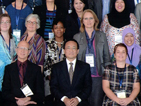Head of the Croatian Agency at the 37th Annual Meeting of representatives of the National Centres participating in the WHO Programme for International drug Monitoring
20.10.2014
The 37th Annual Meeting of representatives of the National Centres participating in the WHO Programme for International drug Monitoring was held from 14-17 October 2014 in Tianjin, China. This meeting was jointly organised by the World Health Organisation (WHO), WHO’s collaborative centre for adverse reaction monitoring, Uppsala Monitoring Centre (UMC), Chinese Food and Drug Administration (CFDA). The Head of the Croatian Agency, Viola Macolić Šarinić, MD, PhD and her co-workers also participated at the meeting. The meeting was attended by some 200 representatives of National centres from 54 countries worldwide participating in the programme.
The Head of Croatian Agency, as a guest of the minister Wu Zhen, Head of CFDA, participated at the gala dinner organised on 14 October by the Minister where they agreed on co-operation between HALMED and CFDA in the fields of pharmacovigilance, especially regarding the training of CFDA experts by HALMED through the programme co-ordinated by WHO. HALMED and the Republic of Croatia are recognised in the world as a centre of excellence in pharmacovigilance. Croatia is the only country in the world among top 20 countries participating in the WHO’s programme for the number of reports per million inhabitants as well as in top 20 countries for the quality of reported and analysed adverse reactions.
At the joint part of the meeting organised by the WHO, where representatives of the National centres and delegates of the 3rd Global Initiative for Safe Use of Vaccines participated, Dr Macolić Šarinić held an invited lecture on including patients’ rights and media in strengthening co-operation of national pharmacovigilance centres and public health programmes, like the immunisation programme, entitled - "Fostering collaboration between national pharmacovigilance centres and public health programmes - Learning from country experiences Croatia (HR)”. She also chaired a roundtable and workshop on including public health programmes in adverse reactions monitoring and presented the successful co-operation between HALMED and Croatian Institute for Public Health in the field of vaccines safety in the Republic of Croatia that became an example for co-operation for other countries in the world where these initiatives have yet to be established.
The meeting encompassed also other numerous topics such as: adverse reaction database for drug interaction development, integration of adverse reaction database and registries of various public health programmes, the influence of Internet and social networks on the safe use of medicines and patient safety, media and safe use of medicines, forecast of possible medication errors in the risk management plan, importance and impact of pharmacovigilance workshops, integration of pharmacovigilance in study curricula at medical and pharmaceutical faculties.
This meeting demonstrated again the importance of interactions among all countries in the world in the field of safe use of medicines where the Republic of Croatia plays a significant and important role.






